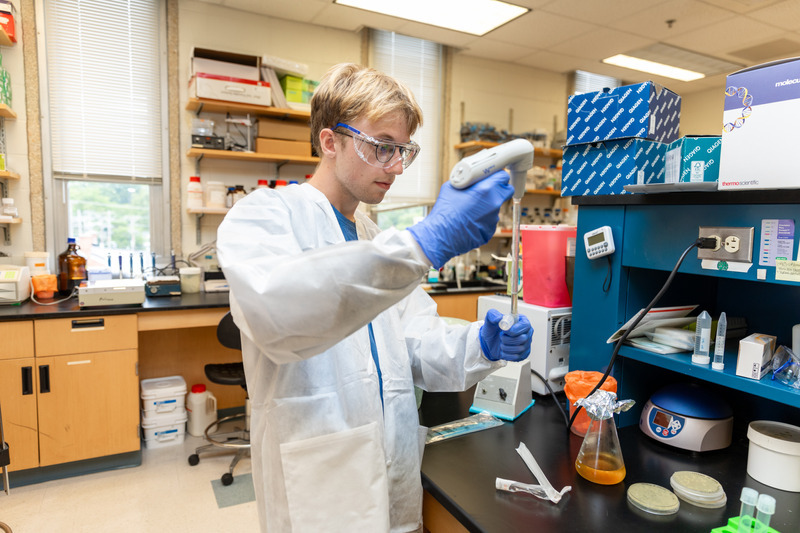


Fueling research careers
Photo by Ashley Barnas Larrimore July 22, 2025
Hands-on biotech training at UD opens doors to elite cancer research labs
John Routzahn grew up fascinated by human disease, but never imagined he’d one day be working to help cure a rare childhood cancer.
The University of Delaware alumnus now works as a postbaccalaureate research fellow at the National Cancer Institute (NCI) in his hometown of Frederick, Maryland. In senior investigator John “Jay” Schneekloth Jr.’s chemical biology lab, Routzahn is focused on targeting RNA structures in the body to develop a treatment for childhood rhabdomyosarcoma, a type of cancer that develops in soft tissue such as muscles.
“I’m fascinated by what happens in the body beyond what we can see and its profound implications,” he said. “I’m also particularly fond of NCI’s mission to study under-researched cancers and contribute to finding a cure.”
Routzahn was drawn to UD after attending an Admitted Students event, where he learned about the University’s prestigious research portfolio.
“Professors were touting UD’s massive research enterprise, and I was thrilled by the chance to get involved in undergraduate research,” Routzahn said.
He initially majored in biochemistry but later switched to applied molecular biology and biotechnology (AMBB) in the College of Health Sciences.
“Dr. Esther Biswas-Fiss, professor and chair of the Department of Medical and Molecular Sciences, was incredibly supportive. She helped me turn things around, and I fell in love with my major; it was the perfect fit,” he said.
The hands-on curriculum became the highlight of his experience.
“The cell culture and molecular diagnostics classes are so relevant to the work I do every day,” Routzahn said.
Routzahn, who graduated in 2024, studied structural and protein biology in a lab run by Karl Schmitz, assistant professor of biological sciences, in the College of Arts and Sciences. Through that experience, his practicum at ChristianaCare’s Gene Editing Institute, and a summer internship at NCI, Routzahn excelled and discovered a passion for molecular biology and RNA.
“I would not have landed my job at NCI without my UD education,” Routzahn said. “I was familiar with equipment and techniques that my coworkers didn’t learn until their Ph.D. or postdoc studies. I had an entire class on flow cytometry, an advanced technique many don’t learn on the undergraduate level. Skills like conducting QPCR, PCR, and Western blot tests were expertly taught to us in the AMBB program, and I use them regularly.”
UD’s AMBB program, created by Biswas-Fiss, fosters stronger partnerships with Delaware’s biotech industry.
“UD’s AMBB program stands out because it offers internships that allow students to hit the ground running,” said Biswas-Fiss. “They’re uniquely prepared to enter the workforce, and many of our students are offered industry jobs or staff scientist roles before graduation.”
Routzahn’s studies at UD and experience at NCI have fueled his desire to earn his doctorate so that he can one day run his own research lab.
“It’s inspiring to contribute to research that makes a huge impact in the world,” Routzahn said. “It’s not easy to land a post-bac position at NCI, but I was a competitive applicant, and my resume stood out, and that says a great deal about the value of a UD AMBB degree in this field.”
Contact Us
Have a UDaily story idea?
Contact us at ocm@udel.edu
Members of the press
Contact us at mediarelations@udel.edu or visit the Media Relations website

